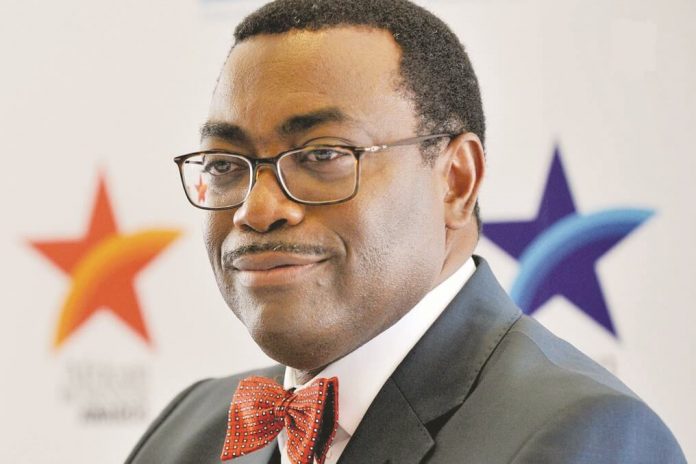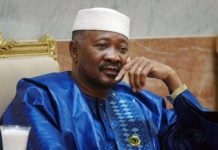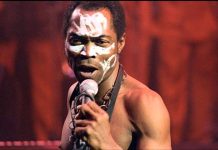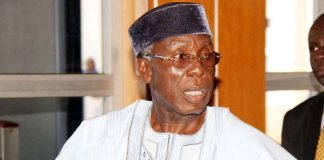Nigeria’s image received a boost last week before the international community as the country’s former Minister for Agriculture and Rural Development, Akinwunmi Adesina, formally received the 2017 World Food Prize award in the US. He was conferred with the laurel in Des Moines, capital of Iowa State, in the US during which he committed the 250,000 dollars cash prize to set up a fund for financing African youths in agriculture.
Dr. Adesina had been announced as the winner of the global feat by the World Food Program, WFP, for his dogged determination and practical commitment to boosting agriculture and food supply chain first as the Nigerian Minister of Agriculture and now as the President of the African Development Bank, AfDB.
In accepting the prize, the AfDB President commended his staff for the shared passion to feed Africa. He expressed gratitude to ex-President Olusegun Obasanjo for nominating him as minister. Dr. Adesina thanked former President Goodluck Jonathan for giving him the opportunity to serve as a minister and also saluted President Muhammadu Buhari for his strong support which he said enabled him to achieve the feat.
The renowned technocrat and scholar declared, “There wouldn’t be any rest for me until Africa feeds itself and for that, we need the youth. And so even though I don’t have the cash in my hand, I hereby commit my $250,000 as a cash prize for the WFP award to set up a fund fully dedicated to providing financing for the youths of Africa in agriculture to feed Africa”.
Dr. Adesina continued, “A day is coming very soon when the barns of Africa will be filled and all her children will be well fed when millions of farmers will be able to send their kids to school. Then you will hear a new song across Africa; thank God our lives are better for us”.
In an interview earlier with newsmen, the WFP laureate explained extensively that African governments were not yet doing enough to boost the agricultural sector. “I think the way that we look at agriculture in Africa has to change completely. Agriculture is not that sector, it’s not some kind of a social sector. Agriculture is not a development activity. Agriculture is a business, and that is so very important. It’s important because what Africa does with agriculture is going to determine the official food in the world.
What do I mean by that? To feed nine billion people in the world by 2050, is going to require a lot of food, and a lot of land. But 65 per cent of all that available arable land to feed nine billion people in 2050 is not in Asia, it’s not in Latin America, it’s not in Europe, or the United States, but right there in Africa. That is the potential. If you see me that I’m a real fan of agriculture, it’s because I think it’s the biggest moneymaking sector that we have. Think about it, the size of the food and agro business sector in Africa is going to be in trillion dollars by 2030. Think of it that way.
However, we have to ask ourselves a question: Are we going to be a market of ourselves, or that of a billion people supplied by others, or are we going to harness that trillion dollar market ourselves? But that requires that we take agriculture as a business, and that is why I believe that the way we deal with agriculture is going to be central to how we do macro and fiscal stabilisation of African economies.
My whole drive is to make sure that Africa heads of governments, and ministers of finance recognise that agriculture is critical to macro and fiscal stabilisation of the economies. It is also for the creation of jobs, to the transforming of our rural areas, and to turning them from zones of economic misery as they are right now to zones of economic misery as they are right now, to zones of economic prosperity. And that can only happen by making agriculture work through agricultural industrialisation.
I don’t think they are doing enough, because I think that the lenses with which we looked at agriculture were the wrong lenses in the past. People looked at agriculture as some kind of a sector in which you use to manage poverty, and not as a way of actually lifting people out of poverty into wealth. People came to accept that it was normal for Africa to be spending $35billion importing food. For me it’s abnormal, and if you don’t change that, that is also going to rise to $110billion by 2025 to 2030.
What I think we are going to really wake up to, is to realise that agriculture is going to be the lifeline for African economies, and we got to really change how we look at it. We have to make it a viable sector; we have to make it a sector that the private sector can invest in significantly. We have to make it a sector that young people get excited about, and therefore can go into, and make a lot of wealth from.
There are challenges in terms of access to technologies in which we have to make sure that we can get those technologies to farmers in the millions, but we know how to do that. In Nigeria, we had to empower the mobile phones to reach over 15 million farmers with seeds and fertilisers for over four years, and it transformed everything, and now we are taking that to scale in about 35 African countries.
There is also a challenge with regard to lack of access to electricity. Yes, if you are in agriculture, you need irrigation to work. You need to be able to process and add value to things, but we know that we can do that with electricity, and we use a lot of solar based system. For every challenge there is a solution, and for every opportunity you see in the world, you should take it. You should never give up on it just because you have challenges of getting it done”.
The Governor of Iowa, Kim Reynolds, who officially declared Dr. Adesina as the 2017 laureate of the WFP, said he was a man who grew out of poverty to create wealth.
Mr. Reynolds said that the laureate’s commitment and dedication in agriculture had impacted on lives of many, not only in Africa but around the world.
The former President of Ghana, John Mahama, and other dignitaries from Nigeria and African countries attended the ceremony.















